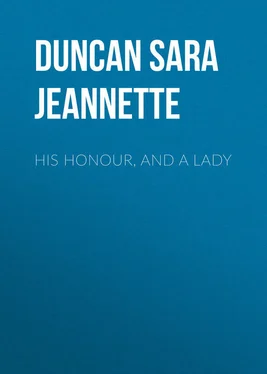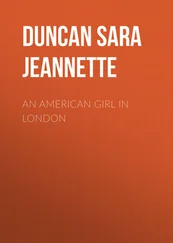Sara Duncan - His Honour, and a Lady
Здесь есть возможность читать онлайн «Sara Duncan - His Honour, and a Lady» — ознакомительный отрывок электронной книги совершенно бесплатно, а после прочтения отрывка купить полную версию. В некоторых случаях можно слушать аудио, скачать через торрент в формате fb2 и присутствует краткое содержание. Жанр: foreign_antique, foreign_prose, на английском языке. Описание произведения, (предисловие) а так же отзывы посетителей доступны на портале библиотеки ЛибКат.
- Название:His Honour, and a Lady
- Автор:
- Жанр:
- Год:неизвестен
- ISBN:нет данных
- Рейтинг книги:5 / 5. Голосов: 1
-
Избранное:Добавить в избранное
- Отзывы:
-
Ваша оценка:
- 100
- 1
- 2
- 3
- 4
- 5
His Honour, and a Lady: краткое содержание, описание и аннотация
Предлагаем к чтению аннотацию, описание, краткое содержание или предисловие (зависит от того, что написал сам автор книги «His Honour, and a Lady»). Если вы не нашли необходимую информацию о книге — напишите в комментариях, мы постараемся отыскать её.
His Honour, and a Lady — читать онлайн ознакомительный отрывок
Ниже представлен текст книги, разбитый по страницам. Система сохранения места последней прочитанной страницы, позволяет с удобством читать онлайн бесплатно книгу «His Honour, and a Lady», без необходимости каждый раз заново искать на чём Вы остановились. Поставьте закладку, и сможете в любой момент перейти на страницу, на которой закончили чтение.
Интервал:
Закладка:
“My dear mummie,” exclaimed Rhoda, as Mrs. St. George expressed her entire concurrence, “don’t be stupid! He didn’t mean that.”
Later Ancram stepped out of one of the open French windows and found her alone on the broad verandah, where orchids hung from the roof and big plants in pots made a spiky gloom in the corners. A tank in the garden glistened motionless below; the heavy fronds of a clump of sago palms waved up and down uncertainly in the moonlight. Now and then in the moist, soft air the scent of some hidden temple tree made itself felt. A cluster of huts to the right in the street they looked down upon stood half-concealed in a hanging blue cloud of smoke and fog. Far away in the suburbs the wailing cry of the jackals rose and fell and recommenced; nearer the drub-drubbing of a tom-tom announced that somewhere in the bazar they kept a marriage festival. But for themselves and the moonlight and the shadow of the creeper round the pillars, the verandah was quite empty, and through the windows came a song of Mrs. Delaine’s about love’s little hour. The situation made its voiceless demand, and neither of them were unconscious of it. Nevertheless he, lighting a cigarette, asked her if she would not come in and hear the music; and she said no – she liked it better there; whereat they both kept the silence that was necessary for the appreciation of Mrs. Delaine’s song. When it was over, Rhoda’s terrier, Buzz, came out with inquiring cordiality, and they talked of the growth of his accomplishments since Ancram had given him to her; and then, as if it were a development of the subject, Rhoda said:
“Mrs. Church has a very interesting face, don’t you think?”
“Very,” Ancram replied unhesitatingly.
“She looks as if she cared for beautiful things. Not only pictures and things, but beautiful conceptions – ideas, characteristics.”
“I understand,” Ancram returned: “she does.”
There was a pause, while they listened to the wail of the jackals, which had grown wild and high and tumultuous. As it died away, Rhoda looked up with a little smile.
“I like that,” she said; “it is about the only thing out here that is quite irrepressible. And – you knew her well at Kaligurh?”
“I think I may say I did,” Ancram replied, tossing the end of his cigarette down among the hibiscus bushes. “My dear girl, you must come in. There is nothing like a seductive moonlight night in India to give one fever.”
“I congratulate you,” said Miss Daye – and her tone had a defiance which she did not intend, though one could not say that she was unaware of its cynicism – “I congratulate you upon knowing her well. It is always an advantage to know the wife of the Lieutenant-Governor well. The most delightful things come of it – Commissionerships, and all sorts of things. I hope you will make her understand the importance of the Vedic Books in their bearing upon the modern problems of government.”
“You are always asking me to make acknowledgments – you want almost too many; but since it amuses you, I don’t mind.” Rhoda noted the little gleam in his eyes that contradicted this. “Sanscrit is to me now exactly what Greek was at Oxford – a stepping-stone, and nothing more. One must do something to distinguish oneself from the herd; and in India, thank fortune, it’s easy enough. There’s an enormous field, and next to nobody to beat. Bless you, a Commissariat Colonel can give himself an aureole of scientific discovery out here if he cares to try! If I hadn’t taken up Sanscrit and Hinduism, I should have gone in for palæontology, or conchology, or folk-lore, or ferns. Anything does: only the less other people know about it the better; so I took Sanscrit.” A combined suggestion of humour and candour gradually accumulated in Mr. Ancram’s sentences, which came to a climax when he added, “You don’t think it very original to discover that!”
“And the result of being distinguished from the herd?”
He shrugged his shoulders. “Well, they don’t send one to administer the Andamans or Lower Burmah,” he said. “They conserve one’s intellectual achievements to adorn social centres of some importance, which is more agreeable. And then, if a valuable post falls vacant, one is not considered disqualified for it by being a little wiser than other people. Come now – there’s a very big confession for you! But you mustn’t tell. We scientists must take ourselves with awful seriousness if we want to be impressive. That’s the part that bores one.”
Mr. Ancram smiled down at his betrothed with distinct good-humour. He was under the impression that he had spontaneously given his soul an airing – an impression he was fond of. She listened, amused that she could evoke so much, and returned to the thing he had evaded.
“Between the Vedic Books and Mrs. Church,” she said, “our future seems assured.”
Ancram’s soul retired again, and shut the door with a click.
“That is quite a false note,” he said coolly: “Mrs. Church will have nothing to do with it.”
CHAPTER III
It became evident very soon after Miss Rhoda Daye’s appearance in Calcutta that she was not precisely like the other young ladies in sailor hats and cambric blouses who arrived at the same time. For one superficial thing, anybody could see that she had less colour; and this her mother mourned openly – a girl depended so entirely for the first season on her colour. As other differences became obvious Mrs. Daye had other regrets, one of them being that Rhoda had been permitted so absolutely to fashion her own education. Mrs. Daye had not foreseen one trivial result of this, which was that her daughter, believing herself devoid of any special talent, refused to ornament herself with any special accomplishment. This, in Mrs. Daye’s opinion, was carrying self-depreciation and reverence for achievement and all that sort of thing a great deal too far: a girl had no right to expect her parents to present her to the world in a state of artistic nudity. It was not in the nature of compensation that she understood the situation with the Amir and the ambitions of the National Congress; such things were almost unmentionable in Calcutta society. And it was certainly in the nature of aggravation that she showed, after the first month of it, an inexplicable indifference to every social opportunity but that of looking on. Miss Daye had an undoubted talent for looking on; and she would often exercise it – mutely, motionlessly, half hidden behind a pillar at a ball, or abandoned in a corner after dinner – until her mother was mortified enough to take her home. Presently it appeared that she had looked on sufficiently to know her ground. She made her valuation of society; she picked out the half-dozen Anglo-Indian types; it may be presumed that she classified her parents. She still looked on, but with less concentration: she began to talk. She developed a liking for the society of elderly gentlemen of eminence, and an abhorrence for that of their wives, which was considered of doubtful propriety, until the Head of the Foreign Office once congratulated himself openly upon sitting next her at dinner. After which she was regarded with indulgence, it was said in corners that she must be clever, subalterns avoided her, and her mother, taking her cue unerringly, figuratively threw up her hands and asked Heaven why she of all people should be given a fin-de-siècle daughter.
Privately Mrs. Daye tried to make herself believe, in the manner of the Parisian playwright, that a succès d’estime was infinitely to be preferred to the plaudits of the mob. I need hardly say that she was wholly successful in doing so, when Mr. Lewis Ancram contributed to the balance in favour of this opinion. Mr. Ancram was observing too: he observed in this case from shorter and shorter distances, and finally allowed himself to be charmed by what he saw. Perhaps that is not putting it quite strongly enough. He really encouraged himself to be thus charmed. He was of those who find in the automatic monotony of the Indian social machine, with its unvarying individual – a machine, he was fond of saying, the wheels of which are kept oiled with the essence of British Philistinism – a burden and a complaint. In London he would have lived with one foot in Mayfair and the other in the Strand; and there had been times when he talked of the necessity of chaining his ambition before his eyes to prevent his making the choice of a career over again, though it must be said that this violent proceeding was carried out rather as a solace to his defrauded capacity for culture than in view of any real danger. He had been accustomed to take the annually fresh young ladies in straw hats and cambric blouses who appeared in the cold weather much as he took the inevitable functions at Government House – to be politely avoided, if possible; if not, to be submitted to with the grace which might be expected from a person holding his office and drawing his emoluments. When he found that Rhoda Daye was likely to break up the surface of his blank indifference to evening parties he fostered the probability. Among all the young ladies in sailor hats and cambric blouses he saw his single chance for experience, interest, sensation; and he availed himself of it with an accumulated energy which Miss Daye found stimulating enough to induce her to exert herself, to a certain extent, reciprocally. She was not interested in the Hon. Mr. Lewis Ancram because of his reputation: other men had reputations – reputations almost as big as their paybills – who did not excite her imagination in the smallest degree. It would be easy to multiply accounts upon which Mr. Ancram did not interest Miss Daye, but it is not clear that any result would be arrived at that way, and the fact remains that she was interested. From this quiet point – she was entirely aware of its advantage – she contemplated Mr. Ancram’s gradual advance along the lines of attraction with a feeling very like satisfaction. She had only to contemplate it. Ancram contributed his own impetus, and reached the point where he believed his affections involved with an artistic shock which he had anticipated for weeks as quite divinely enjoyable. She behaved amusingly when they were engaged: she made a little comedy of it, would be coaxed to no confessions and only one vow – that, as they were to go through life together, she would try always to be agreeable. If she had private questionings and secret alarms, she hid them with intrepidity; and if it seemed to her to be anything ridiculous that the wayward god should present himself behind the careful countenance and the well-starched shirt-front of early middle-age, holding an eyeglass in attenuated fingers, and mutely implying that he had been bored for years, she did not betray her impression. The thrall of their engagement made no change in her; she continued to be the same demure, slender creature, who said unexpected things, that she had been before. That he had covetable new privileges did not seem to make much difference; her chief value was still that of a clever acquaintance. She would grow more expensive in time, he thought vaguely; but several months had passed, as we have seen, without this result. On the other hand, there had been occasions when he fancied that she deliberately disassociated herself from him in that favourite pursuit of observation, in order to obtain a point of view which should command certain intellectual privacies of his. He wondered whether she would take this liberty with greater freedom when they were one and indivisible; and, while he felt it absurd to object, he wished she would be a little more communicative about what she saw.
Читать дальшеИнтервал:
Закладка:
Похожие книги на «His Honour, and a Lady»
Представляем Вашему вниманию похожие книги на «His Honour, and a Lady» списком для выбора. Мы отобрали схожую по названию и смыслу литературу в надежде предоставить читателям больше вариантов отыскать новые, интересные, ещё непрочитанные произведения.
Обсуждение, отзывы о книге «His Honour, and a Lady» и просто собственные мнения читателей. Оставьте ваши комментарии, напишите, что Вы думаете о произведении, его смысле или главных героях. Укажите что конкретно понравилось, а что нет, и почему Вы так считаете.












